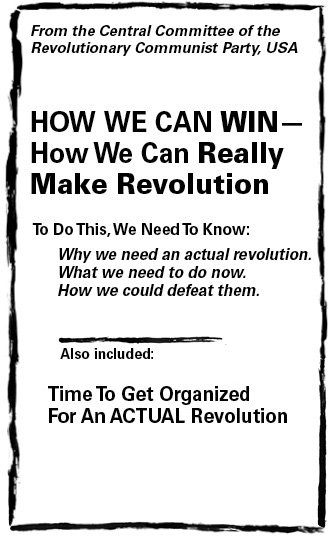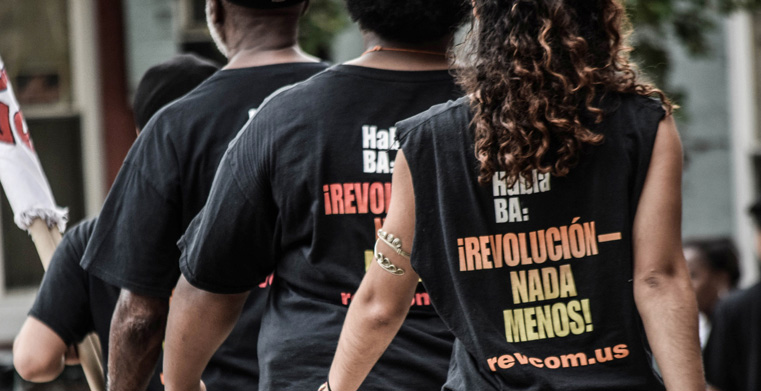Interview with members of the Revolution Club, Los Angeles, on their trip to San Diego and the San Ysidro point of entry at the border
| Revolution Newspaper | revcom.us
Thousands of migrants are amassed at the U.S./Mexico border—forcibly held on Mexico’s side in an arena in Tijuana. They walked thousands of miles to apply for asylum only to be treated as a subhuman burden by officials on both the U.S. and Mexico sides. These are people who have had to flee for their lives because this system has devastated their home countries. On Sunday, November 25, there was a protest on the U.S. side of the border in support of the caravan, with the demand: Let Them In! This coincided with a protest on the Mexican side of migrants demanding that the U.S. expedite the asylum process. When people decided to make a run for the border, the protest was met by Border Patrol, who attacked the migrants with tear gas.
The Revolution Club, Los Angeles went to the border at the San Diego/San Ysidro point of entry for this protest and the week after, to learn about the situation, and to bring people the strategy for revolution, HOW WE CAN WIN, How We Can Really Make Revolution, and the speech by Bob Avakian, Why We Need An Actual Revolution And How We Can Really Make Revolution. The following are excerpts from an interview with two members from the Revolution Club, LA who were part of these trips.
Q: HOW WE CAN WIN lays out that we need to oppose and disrupt the moves of the ruling powers to isolate, encircle, and brutalize and mass incarcerate the most oppressed, the people who have the hardest life under this system and who most need revolution. We need to encircle them by bringing forth waves and waves of people, determined in opposition to this system.
What was it like actually trying to apply this strategy down there? How do you see going down there as part of applying this strategy? And how do you guys see the fascist response to this caravan—teargassing children, sending even more troops to the border—as a strategic weakness of this system?
Rev Club member 1 (RC1): Somebody pointed out to me that this is the largest border that’s maintained between an oppressed and an oppressor nation in the world. This is also one of the most economically prosperous borders in the world as well. So how does this system maintain that? They can’t just shut it down, because they need that commerce coming back and forth. But then at the same time, they’ve created such horrible conditions by oppressing these other countries, by fucking them up even worse than they’ve fucked up this country, that people have to flee. They’ve basically set these houses on fire so that they can make something off of the fire sale, and now there’s all these people who have nowhere to live. The United States can’t take them in, because then that would be a contradiction to them where they would be like, “oh, good, now you’re going to become someone we have to take care of then”, instead of the burdens being on the countries the U.S. has messed up.
That would mess up the whole exploiter/exploited dynamic that the U.S. has going in its favor right now. So that’s how I understand how this Stop (Stop the Demonization, Criminalization and Deportations of Immigrants and the Militarization of the Border)1 is something they can’t resolve and how it’s so critical.
There’s no way for people to seek asylum. They weren’t even allowed to go through the process on that day. We’re not even talking about crossing at unauthorized points, and anyone who knows the law knows that even those unauthorized crossings are legal if you’re seeking asylum. But here they tried to come through the main entry and they were denied. So they did what they rightfully should have done, saying “No, we’re coming in anyway.” And the U.S. just had to bare its ugliness, its fangs. They couldn’t even pretend, well, it’s the process, the process. No, they had to unleash their weapons, their tear gas on people.
That happened right after there had been a march on the U.S. side in support of the caravan. So that was kind of the scene for the day when the teargassing itself went off.
Rev Club member 2 (RC2): It was a very chaotic scene. There was smoke all through the air. Then all these military trucks look around—they were patrolling. People are trying to get in because they can’t go back. Some of them will die if they go back. They’re fleeing the violence, the poverty. And then you see the picture of the woman with her two kids who were fleeing the smoke. I read that some of the kids got sick from inhaling the smoke. That’s fucking criminal, for the system to put their enforcers on the border to attack people who are unarmed, who are fleeing the violence that this system carries out in their countries, and the poverty and ruining the economy and making it impossible for people to live in their countries. And to greet people like that at the border with rubber bullets and teargas. That’s criminal!
This is a criminal system that cannot be reformed. That’s the whole point of the 5 Stops. These are things that cannot be reformed under this system. This is the foundation of this country up until now, a country founded on slavery and white supremacy and genocide of Native people and wars of empire, the theft of land. They like to promote themselves as the land of freedom and democracy and all this bullshit. And look what they do. Look what they carry out all over the world.
Q: So you guys were there for a few days. What was that like, being right there at the point of entry? What was the approach to that and what were some of the responses from people passing by?
RC1: We went to the college the first day spreading the word about the revolution, wielding HOW WE CAN WIN and BA’s work, doing agitation, talking about the situation at the border. But we didn’t really actively organize folks. Every day we kept summing this up. Are we organizing people? Each day we got a little more on point with that. So the first day at the university was like going around and getting the word out. At the end of the day I thought we had some good conversations. We went to this one teach-in they had where they were putting all sorts of bullshit out from the stage—like, this is going to provide an opportunity for the new ruling party in Mexico to do something good for the people... so off of that, we got into more in-depth conversations with people.
When we were down at the border, you were dealing with a lot of folks who mainly were living on both sides of the border. And here you see the need to understand the cause of all of what’s happening. Even some people who sympathized with the caravan didn’t understand why it was that these refugees were forced to come here. One person who said his heart goes out to them, he thought they had been brought here by the old ruling party in Mexico as some attempt to destabilize the new incoming party. But he still had sympathy for them. He wasn’t blaming the refugees, but he didn’t fully analyze the driving force of this as capitalism, and all the horrors it’s created in Honduras.
So while it is good that we got out this information, to make it grow, to get to the level it needs to, we need to get people actively taking it up. Not just, “Cool, I’ll check it out,” but finding ways to plug in themselves. You could see that, by the last day, in terms of that, we were really firing on all cylinders.
RC2: The approach was from HOW WE CAN WIN. Everything we do, how is that getting us to where we need to go—to being in position to make revolution? We did start off not all there, but we kept summing up, and we kept emphasizing, look, we’re going to make mistakes, and as scientists, we need to sum up, and how can we actually make leaps and continue to grow and actually do the work that’s needed to get to that point where we can go all out (for revolution). This is the stage, like Part 2 of HOW WE CAN WIN (where we are doing the political work to prepare the ground, spreading the word, transforming the people, forging logistical networks and a mass movement for revolution, and bringing forward leaders, all with the aim of hastening while awaiting a revolutionary situation where we are in a good position to go up against the system and actually win). This is what we need to do now.
We went out there, and in the agitation we were exposing what had just happened. What kind of system sends its military to the border—we talked about it already, but what system does this to human beings? A criminal system. That’s what was coming out of the bullhorn and the conversations we had. That was the essence of it.
Q: I think people can learn from that. You said you were applying and summing up based on our strategy, HOW WE CAN WIN, using HOW WE CAN WIN as a concrete measure of the work you were doing. So what was in that process of summing up? What kind of questions did you guys get into when you summed up, and how do you see the difference in approach?
RC2: BA makes the point of not just getting “thumbs up.” That first day I thought that was just what we were getting, just “thumbs up.” But what were we trying to do? We talk about the horrors of the system, and there’s actually a way to put a stop to this. What is the role of the masses of people? What role do they have in carrying that out? What’s our role, to unleash people to do that? That’s some of the things that we got into. For whom and for what? (For the emancipation of all of humanity, to get to a communist world.) That was the main thing.
RC1: It felt to me like the one thing that finally clicked was one day we were talking about asking for donations. We were also talking about why we didn’t get this one guy’s number. And I thought to myself, “I don’t know, I just don’t ask for donations,” because like, I don’t want to seem like I’m begging, and then I didn’t ask for this one guy’s number because he didn’t seem like your “typical revolutionary.” He seemed like a good person, but not someone who seemed down for the whole thing. But then I told myself, wait, I’m not asking for donations because what? We actually do need millions of dollars—for materials, even gas money to travel to spread the revolution. Talk about being un-materialist if you don’t get that! And then, this one guy, I just assumed he couldn’t be won to play an active role. But how much is this not seeing the potential for this guy, and people like him, to potentially make a big influence? The more I grounded myself in the reality of what was needed, the emergency situation we’re in, that I was able to break with the idea of just more passively “spreading the word.”
That’s great if people do spread the word about this, but you can do that really easily without having to really change your perspective or your orientation on the situation. Spreading the word is something you can and should just do in your spare time. But actively trying to create a revolutionary situation, and conduct a revolution, you’ve got to be doing a whole lot more than that.
It really felt like it was a kind of click, a eureka moment, where I just go, I’m going to be acting commensurate with what’s needed. For some reason that just clicked. Maybe it was all the summations we had.
Q: You were saying you were talking to people who had a lot of sympathy and heart for this caravan, but they didn’t really understand why the caravan was coming in the first place. I wanted to get into what were the responses to bringing out the message of revolution to people? How did people see or understand why this caravan was coming to the U.S., and why it was being teargassed? How did people see that? Is that something you got into with people you were talking to?
RC2: What people said most was, “They’re risking their kids. It’s an unnecessary risk. Why are they putting their kids through that?” We spoke to what people were saying. The thing that I got from that was people don’t really have a grasp of why all this is happening. That was some of the things that we got. Like in agitation and in conversations, why is this happening? Why is it that people had to flee their country?
Most of the people we ran into, they live in Tijuana, but they work in San Diego or San Ysidro. So they were talking about the inconvenience of being stuck for hours in the line trying to cross over. And they had some resentment because of that toward the people in the caravan. But then, in the struggles that we had with people, we said, look, raise your sights. You were stuck in a line for two or three hours. But then these people are stuck in this fucking shelter and they’re being threatened by the fucking fascist regime in power. There’s military at the border. So that was the struggle with people to raise their sights and not have these fucking petty complaints.
RC1: We ran into this. I’d say it was pretty common. You could tell that whole line of “They’re being bused here”—whoever started that conspiracy theory, it’s giving folks something to hang their hat on, folks who want to be mad because of the situation that’s going on, now all of a sudden, they’re like, “Yeah! They’re getting bused here.” It gives them a quick, easy out...
But we would challenge people with this. There was this young woman, and we challenged her about this, why would you be mad at these people? And she said, I guess I’m a little selfish. But she got challenged on it and she basically changed her thinking.
RC2: She said, “I didn’t see it that way.”
RC1: It was the same with another guy. He was mad because he had to wait in line. He didn’t have some theory for it. But I told him, you’re asking the wrong question. You need to ask why are these people in this situation? They’re being forced to flee for their lives. And he was like, yeah. A lot of people were glad to be challenged and have their sights raised.
This one woman was concerned. She said, “I see what they’re doing, but they’re coming in at the wrong spot.” The proper spot? I didn’t even want to go into the details about how you can’t get in the proper spot. I told her this is like someone is starving and you’re mad at them because they come in the back door trying to get some food. You’re not asking why they’re starving. It didn’t take much to pierce through the veneer. Like somehow it could have been avoided. No, it couldn’t be avoided. These people are fleeing for their lives.
If you just raise to them the moral aspect of it they would back down real quick. And then when you showed them the actual driving force behind it, the evidence of the system of capitalism (the fact that people are compelled to come here because of the dynamics of capitalism/imperialism) then they would even understand more so. And then there’s this aspect of, you’re not down there just exposing it. You’re actually organizing to do something about it. That’s the X factor in this. Nobody else is not just trying to fight this one outrage, but to do away with this outrage all together.
One guy got really excited about it. He had this vision, we’ll get a bunch of signs and stuff. We were like, yeah, we’ll do that. But more important is that people understand what the Revolutionary Communist Party is trying to do. So that people finally realize not to fall for one line or another. They actually see that the Revolutionary Communist Party is leading with the way out. It’s not a short term, “We’ll buy you some time for a month,” but actually end the driving force behind this.
RC2: The last day we met this Latino guy who was very excited about revolution. He was talking about how he was afraid the young women...
RC1: He said that 10 percent of the young women in these camps were getting prostituted by the cartels. He said in a few months it will be like 50 percent. He remembers when the Haitian immigrant crisis occurred last year in Tijuana. Now you see a lot of young Haitian girls walking around pregnant, and they don’t have a partner, and it’s because there’s a good chance the cartels grabbed them up and prostituted them. It’s got this real hatred for the cartels because of the way they run stuff down there.
He said if you’re an ex-prisoner, they tell you, you’re either going to use or you’re going to sell. Some friends got killed because they wouldn’t do either. Somehow he’s managed to escape. He’s not even sure how he’s escaped it.
These people aren’t just sitting in some shelter killing time. People are fleeing for their lives and now they’re having to watch their back to make sure they stay alive because they can’t get asylum.
This guy, he wanted to get this message out, and he wanted people to get organized because his heart really went out for them.
There was this young woman I talked to in the park. I remember she was concerned about revolution. She said, “It sounds like a lot of violence, people may get hurt.” I explained that’s why we’re doing this work right now. Because we can’t be foolish. I showed her the trailer of BA’s new talk, Why We Need An Actual Revolution And How We Can Really Make Revolution, and she’s like, “It sounds like he’s taking it serious, like he’s not foolish with people’s lives.” I thought that was good that she was able to get that from the trailer. We also did challenge her about the violence that occurs right now. But then again, you can understand why people don’t want to just haphazardly go into something like this. They want to go in with the best chance of getting out of it with something good on the other end. And if you add in the fact that if you don’t do it right, you can be in the same mess again.
I used HOW WE CAN WIN a lot of times when I was talking to people and made the point of how we’re in Part 2 right now. And the work we’re doing is critical to making Part 3 (the stage of armed struggle in the future) be able to get off when conditions have radically changed and millions are ready to put it all on the line.
I led with it. I don’t know how good a job I did with making sure that people really understood the importance of Part 2. It’s a process. You have these conversations, and people were like, yeah! And then they go back to “It’s Mueller time.” Or we need to get Bernie in, or Elizabeth Warren. Like I said, it’s a process.
People would openly admit that they spend a lot of time checking out Rachel Maddow or something like that. You really have to get all of that stuff out of there. It’s almost like, shoot down all these things they think are going to solve it. It’s like, OK, let’s walk that through.
RC2: We had a lot of conversations with a lot of people. We sat down with someone who was talking about getting Bernie in, or Elizabeth Warren, to be part of the revolution. He had these illusions. I mean, for some people, mostly American people, they might have a heart, and had to struggle with that person that these are all representatives of the system. One thing they all agree with, Trump is America First, that type of shit. Even the Mueller shit, we said to this person, OK, you’re waiting for that, but even for that to happen, there has to be people out in the streets, pouring into the streets and protesting and demanding the removal of this regime. We had a lot of back and forth struggle with this person.
RC1: At the teach-in we went to on the first day, we actually made an announcement about what we were about. They had to pay a little attention to what we were doing. So when people came out, we were like, “What did you think of what we had to say,” and there was a lot of, “Oh, yeah, that’s good.” And we were like, “No, did you get what we were talking about? Did you get we were talking about a revolution?”
I talked to two guys who talked about spending a good chunk of their lives in East LA and how the police would mess with them back then. There was a certain sentiment of, “What gives them the right to treat us bad?” Talking about the police. I tried to get into, “your outrage is justified, but it’s not just that these police are bullies. They are bullies, but it’s not just that they happen to be bullies, it’s actually that they have to do this in order to maintain their system.” This one guy talked about when he was young the cops would round up him and his friends, because they were in gangs, and they would make them strip, and they would take their clothes and throw them away and they’d go, alright, go survive. It was humiliating, running around the street naked trying to find your clothes.
I tried to get into what compelled that to be the kind of behavior that was encouraged. You can imagine some cop getting a promotion because he’s really good at getting all the young kids to be afraid of him.
Under the system, people aren’t trained to do the critical thinking, to probe deeper. I mean, shit, it’s hard even to have the time, given their day-to-day life. So when the news channel promotes some conspiracy theory, and you’ve got five seconds to pay attention to it, it fits your feeling that there’s something wrong and this is the quick solution. So I think bringing to people the need to probe, to ask questions, to say, does that add up? This huge group of people from another country would all of a sudden just decide they don’t want to obey the rules and laws? That alone should make you question. There’s something out of the ordinary there. Which again is where the, “oh, it was so-and-so busing them up here” helps to solve that. Why all of a sudden there’s this huge influx ?
RC2: Some of the conversations I would have, I was putting forward the problem of why are these things happening. And I would bring in the solution, and the leadership and strategy we have, to be able to go out and do what’s needed. A lot of the people were interested, and they wanted to know more, so we told them to go watch the film, and we would set up appointments with them. And we set up tasks, of taking the palm cards out and going to their friends or family members to organize a screening of the film.
We had the 5 Stops on a display on the street corner, and a lot of people kept coming by and stopping and reading it. We would go up and ask them, so what do you think? And they were like, yeah, I agree. And some people off of reading that just came up and gave donations. I thought that was significant. We would get into HOW WE CAN WIN, and emphasizing that we have the leadership of BA. So people took up the newspaper, and tasks.
RC1: I remember this one guy in Chicano Park. He was fascinated by the fact that we had a Constitution. He was in a rush. But then he was, “Let me get a picture of that Constitution.” I don’t even think we got into what the Constitution is all about. But there’s something about that that appeals to people.
Q: You’re talking about showing the trailer of BA’s speech. Is there more to say about how we utilized that, and what were the responses to it? I think things like dropping a donation when they see the 5 Stops, making appointments, all that’s important. Is there more to say about that?
RC2: We showed the trailer of the new film to some people. The response was that they agreed, and they didn’t know there was someone like Avakian who’s putting this forward. So they were like intrigued and wanted to know more.
One way that we involved somebody was setting up a film showing at their college. They said they would go and talk to a professor or some of the staff to see if they could get a room. So they were able to do that. Some of the things I was thinking was, people we met in the city, like bringing them all together and have a film showing at the school. It’s a work in progress right now.
Q: One of the last questions I wanted to get into was comparing and contrasting what you guys learned in the method and approach in bringing the message of revolution to people and organizing people into the movement for revolution. Is there any comparing and contrasting you can do about that? What did you learn about method and approach to going and running with this?
RC2: Well, this was my first time leading others in a crew, in the Revolution Club. Learning to do that, how to become a strategic commander of the revolution and a leader among the people. And for method and approach, that’s very important to have a scientific method and approach. Obviously people are going to make mistakes, but if you have that approach, you sum it up collectively, and you’re grounded on the new synthesis of communism that Avakian has developed, you’re grounded in that scientific method and approach, and that enables people to go out and carry out the work that’s needed.
Even in my thinking, I made some ruptures, and I learned a lot. Even in orienting people to go out and carry out revolutionary work. All of us, we’re still learning. But for me it was very exciting to go out in the world and bring this to people, and even leading and unleashing others to go out and do the same.
With everything grounded on for whom and for what, that this is for the people. It’s not about ourselves, it’s not about egos, or any of this shit. It’s about the people of the world.
BA makes the point. We have two choices, either to condemn future generations to the same or worse, or make revolution. That’s a task that we set out to do.
So I learned a lot. Comparing and contrasting how to organize people on the spot. That is something we’ve been wrangling with, and we’re learning how to do that. Also giving people tasks to take up. Even setting up appointments with people to meet up, and start a working relationship with people. That’s a way for them to step into the movement for revolution.
RC1: The main takeaway I came away with from this is: the more grounded in reality you are, that you’re not just going to be able to spontaneously get a bunch of people to do the right thing at the right time. In order to make people fight through, push back, they’re going to have to be deeply grounded in what’s necessary. The more grounded you are, the more you understand how important the work you’re doing right now is. At least right now, we can openly go out and do this. And when you gather that knowledge, you act in accordance. I found that that was the biggest change in my approach and my method grew out of that at the same point. What’s the saying? You want revolution so bad you have to become scientific. You realize you’ve got to be on top of it so bad, all of a sudden you start following up on every little thing you can, or catching up on things, or having even more thorough conversations with folks.
Q: Is there anything else you guys want to add?
RC2: People need to watch the speech from BA, Why We Need An Actual Revolution And How We Can Really Make Revolution, because it does get into, emphasizing in the first part that this system cannot be reformed, some of the things that we talked about here, but he gets into it deeper, of why and what is the history of this country? And then emphasizing why we need revolution. And then the second part is how we can do it. He does answer a lot of the things that people say—they’re so powerful, or people are too messed up. And BA talks about it in the film.
So people need to watch it, and people need to have their thinking challenged. People should welcome that because if people are really serious about putting a stop to everything that goes on in this world, and everything flows from this system, the unnecessary suffering. So people should welcome the challenge and actually take up and be a part of this movement for revolution, in whatever beginning ways. But there’s a place for people in this movement. So take this up, and go out in society and actually do the work that’s needed to get to where we need to go.
Q: What would you say to people reading this or hearing this all over the world?
RC1: Besides Fuck the Police and La Migra? They do need to hear that, because it’s part of the revolutionary spirit, the fighting spirit people need to have in order to be willing to do the right thing at the right time. It becomes more and more clear what BA is demonstrating. I know I take it for granted. I know I don’t fully understand it because it’s on a higher level. He’s demonstrating 40 years of science, and work that’s been put into this revolutionary theory. So he’s a master at it, and he demonstrates that through the process that he leads. And the more you watch the speech and these Q&A’s, the more you can come to take up this science and revolutionary understanding and be able to demonstrate it, to use it yourself when you’re out there doing this necessary work. So people should appreciate what we have in BA.
As I said, I don’t think I fully appreciate it, but as I engage with him more and more, I start to understand why it’s so important, and why other people should engage with him as well.
1. The 5 Stops are concentrated descriptions of major social contradictions and oppressive conditions affecting the masses of people here and around the world. Under the system of capitalism-imperialism, none of these contradictions can be solved in the interests of the people here and worldwide. These 5 Stops point to compelling and fundamental reasons why we need an actual revolution that overthrows and uproots this system. [back]
Spread this trailer everywhere.
WATCH THE ENTIRE TALK AND Q & A HERE
Share widely on social media
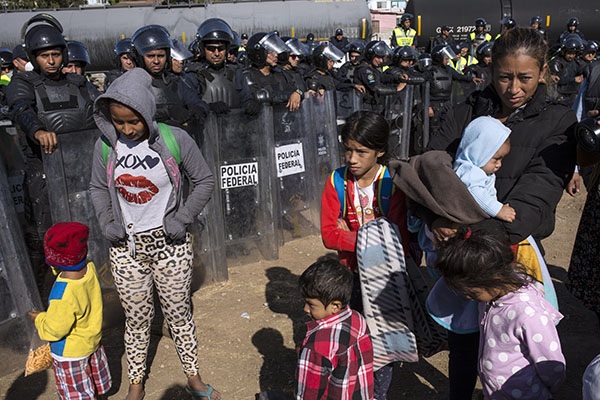
People who had walked thousands of miles to apply for asylum were confronted by riot police, helicopters, machine guns, and soldiers. Border Patrol threw tear gas at these migrants, including small children and babies! (Photo: AP)
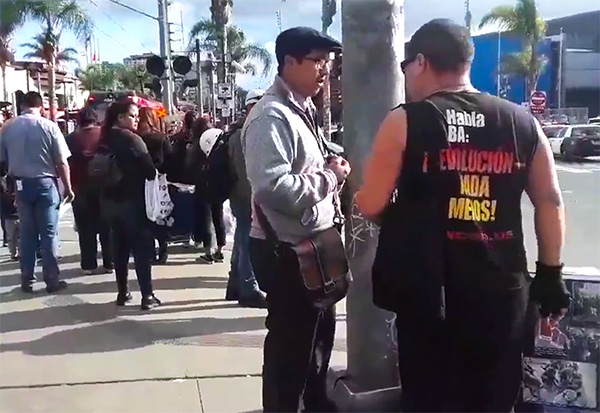
LA Revolution Club talks with people at the San Ysidro border.
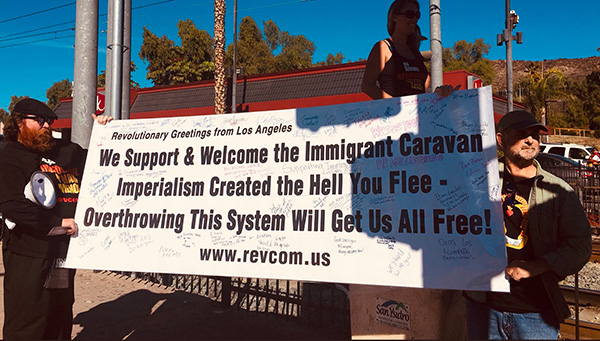
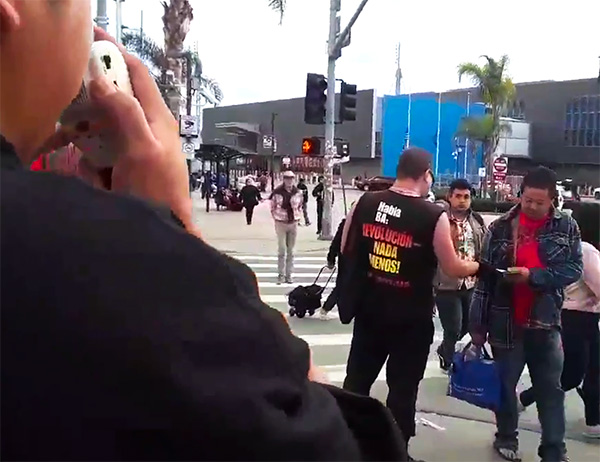
LA Revolution Club member talking to people at the San Ysidro border commented: "A lot of people were glad to be challenged and have their sights raised."
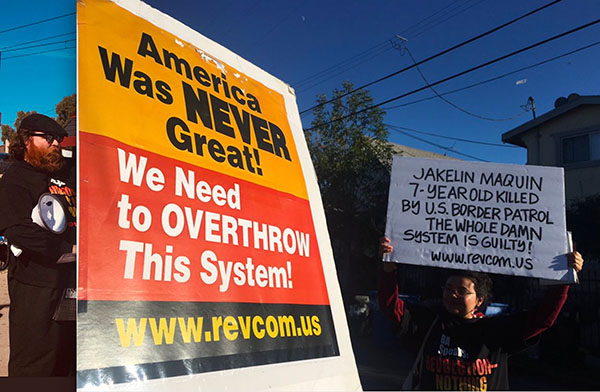
Get a free email subscription to revcom.us:


